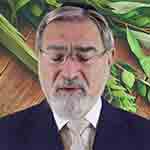Rabbi Jonathan Sacks (above) speaks about the first time he built a sukkah.
Sukkot (סוכות) is also called the Feast of Tabernacles, and the Feast of Ingathering. It begins on the fifteenth day of the seventh month, Tishrei (Tishrei 15–22). That falls from late September to late October. In the Bible, it was one of the Three Pilgrimage Festivals.
It marks the end of the harvest:
You shall observe the festival of weeks, the first fruits of wheat harvest, and the festival of ingathering at the turn of the year. (Exodus 34:22)
And it commemorates the Exodus:
You shall live in booths for seven days; all that are citizens in Israel shall live in booths, so that your generations may know that I made the people of Israel live in booths when I brought them out of the land of Egypt: I am the Lord your God. (Leviticus 23:42-43)
It is mentioned in John 7
On the last day of the festival, the great day, while Jesus was standing there, he cried out, ‘Let anyone who is thirsty come to me, and let the one who believes in me drink. As the scripture has said, “Out of the believer’s heart shall flow rivers of living water.” ’ Now he said this about the Spirit, which believers in him were to receive; for as yet there was no Spirit, because Jesus was not yet glorified. (John 7:37–39)
Every day of Sukkot, water was drawn from the Siloam spring in Jerusalem and poured on the altar in the Temple.
This year’s dates: sunset September 23, 2018 (Jewish Year 5779) until the evening of September 25are yom tov. They have similar obligations and restrictions to Shabbat, work is forbidden, candles are lit in the evening, and festive meals are enjoyed. Sunset September 25 until sunset September are known as Chol Hamoed.
Sunset September 30 until sunset on October 2 are separate holidays: Shmini Atzeret and Simchat Torah.
For further reading (offsite): What Is Sukkot?
If you appreciated this post, do remember to like the liturgy facebook page, use the RSS feed, and sign up for a not-very-often email, …




I very much like the idea of remembering-by-doing, especially where the act involves an inescapable feeling of a bit of what it must have been like… “Israel was to observe the holiday in the present in order to remember something God had done in the past, while looking forward to some future prophetic purpose hidden within each festival.” as https://feast.icej.org/about puts it.
I find it interesting that it was the only festival to which the “Gentile nations” were invited, but the most interesting thing for me is the part of the story, earlier in John 7, when Jesus goes secretly… I wonder if there should be a Church tradition based on that?? Perhaps Bishops tip-toeing into churches wearing a disguise?
I agree with you, Mark – bishops should regularly be at ordinary services (to complement their experience of full-because-the-bishop-is-coming). Thankfully, our Christchurch bishop-elect has very wide experience of ordinary church life.
Passover begins with, “why is this night different…”, nor “why was that night different…”. That is exactly your point.
Blessings.